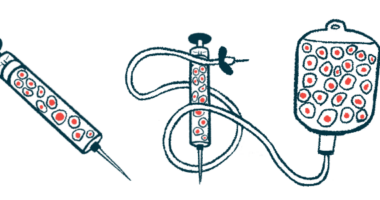KONFIDENT trial of sebetralstat for HAE fully enrolled
Patients in Phase 3 study may continue treatment in two-year extension

The Phase 3 clinical trial of oral sebetralstat as an on-demand treatment for swelling attacks in people with hereditary angioedema (HAE) has reached its target enrollment of 114 patients.
Findings from the global KONFIDENT study (NCT05259917) are expected by year’s end, according to the therapy’s developer, KalVista Pharmaceuticals. Should they be positive, KalVista expects to seek U.S. approval for sebetralstat in 2024.
The company and Japanese regulatory authorities also have discussed a potential pathway to sebetralstat’s approval there.
“We have made a great deal of progress over the last fiscal year in the development of sebetralstat,” Andrew Crockett, CEO of KalVista, said in a company press release.
Oral sebetralstat, formerly KVD900, being tested at two dose levels
The overactivity of an enzyme called kallikrein is responsible for the excessive release of bradykinin, a pro-inflammatory molecule that drives swelling attacks in HAE patients.
Sebetralstat, formerly KVD900, is an investigational on-demand therapy that works to block kallikrein. It is intended to be taken at the start of an attack to prevent its worsening.
Data from a Phase 2 trial (NCT04208412) showed that on-demand treatment with sebetralstat led to the rapid relief of attack symptoms in 68 adults with HAE types 1 and 2 who regularly experienced such attacks.
KONFIDENT aims to further evaluate sebetralstat’s safety and efficacy with on-demand use. Three separate swelling attacks will be assessed in each of its 114 HAE types 1 and 2 patients, ages 12 and older. In random order, attacks will be treated with a 300 mg sebetralstat film-coated oral tablet, a 600 mg tablet, and a placebo tablet.
The trial’s main goal is to assess the time to the beginning of symptom relief after taking the medication.
Participants who finish the trial will be able to enter a two-year open-label extension study called KONFIDENT-S (NCT05505916), in which sebetralstat’s long-term safety will be monitored. KONFIDENT-S is enrolling up to 150 HAE patients, ages 12 and older, and is expected to conclude in early 2026.
Therapy as dissolving oral tablet also in development
Meanwhile, the company is testing a new formulation of sebetralstat as an orally disintegrating tablet (ODT). Such tablets would dissolve on the tongue instead of being swallowed, potentially offering more convenience to patients.
Results from a Phase 1 trial indicated the ODT version of the therapy had similar pharmacological properties to its film-coated tablet version.
In feedback to KalVista about sebetralstat ODT’s development, the U.S. Food and Drug Administration did not indicate a need for additional efficacy trials.
A separate preventive HAE treatment now in preclinical testing is KV998086, an oral small molecule inhibitor of activated factor XII. KalVista plans to request the start of a KV998086 clinical trial by the end of the year, it reports on its website.







